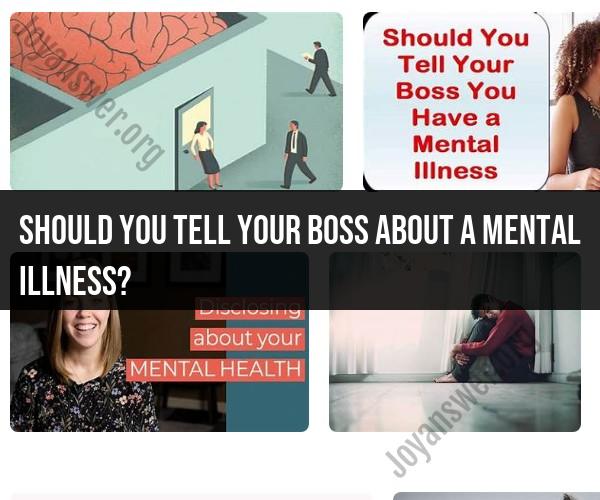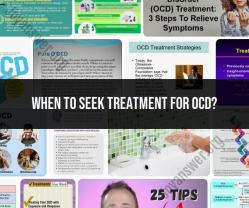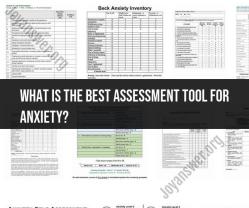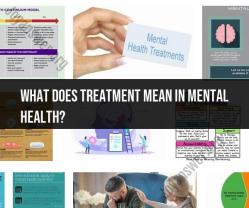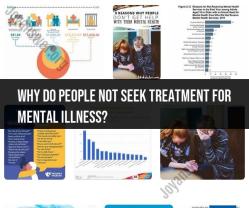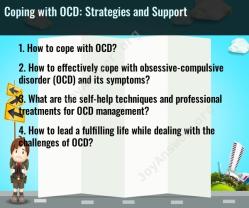Should you tell your boss about a mental illness?
Whether to disclose a mental illness to your boss is a personal decision that depends on various factors. There are pros and cons to consider, and the choice should be made based on your individual circumstances and needs. Here are some key considerations:
Pros of Disclosing Mental Illness:
Accommodations: Disclosing your mental illness can allow your employer to provide reasonable accommodations to support your well-being at work. This may include flexible work hours, modified job duties, or additional support.
Reduced Stigma: By openly discussing your mental health, you contribute to reducing the stigma associated with mental illness in the workplace. This can help create a more inclusive and supportive work environment for yourself and others.
Legal Protections: In many countries, including the United States, anti-discrimination laws protect individuals with disabilities, including mental health conditions. Disclosing your mental illness can help ensure that you receive the legal protections you are entitled to.
Access to Resources: Your employer may have resources and Employee Assistance Programs (EAPs) to assist with mental health issues. Disclosing your condition can make these resources accessible to you.
Cons of Disclosing Mental Illness:
Privacy Concerns: Disclosing your mental illness means sharing personal information, and this can lead to concerns about privacy and potential stigma. You may fear judgment or discrimination.
Workplace Reactions: The way your boss and colleagues react to your disclosure can be unpredictable. While many employers are understanding and supportive, there's always a risk of negative reactions or bias.
Job Security: In some cases, revealing a mental health condition may lead to concerns about job security, especially if you work in a job where mental health is highly scrutinized, such as certain security or public safety roles.
Considerations:
Timing: Think about when and how to disclose. You might choose to do it during a private conversation with your boss or via email. Consider disclosing when it's necessary, such as when you need accommodations, rather than immediately upon starting a job.
Know Your Rights: Familiarize yourself with the employment laws and protections in your country or region. Understanding your rights can help you make an informed decision.
Seek Professional Guidance: Consult with a mental health professional or therapist for guidance on whether and how to disclose your condition to your employer. They can offer strategies for managing your mental health at work.
Support System: Consider discussing your decision with a trusted friend, family member, or colleague who can provide emotional support and guidance.
Assess Your Workplace: Evaluate the workplace culture, your relationship with your boss, and the level of support available. This can help you determine the best approach.
Ultimately, the decision to disclose a mental illness to your boss should be based on what you believe is in your best interest. Some individuals may find it empowering and beneficial, while others may choose to keep their mental health private. It's important to prioritize your well-being and seek the support you need to perform your job effectively while managing your mental health.
Should you disclose a mental illness to your boss or employer?
Whether or not to disclose a mental illness to your boss or employer is a personal decision. There is no right or wrong answer.
Some people choose to disclose their mental illness because they believe it is important to be honest with their employer and to build trust. Others choose not to disclose their mental illness because they are concerned about discrimination or stigma.
What are the considerations and consequences of sharing mental health issues with your boss?
There are a number of considerations and consequences of sharing mental health issues with your boss.
Considerations:
- Your relationship with your boss: Is your boss someone you trust and feel comfortable talking to about your mental health?
- The culture of your workplace: Is your workplace supportive of mental health?
- The potential benefits of disclosure: Could disclosure help you to get the support and accommodations you need to be successful at work?
- The potential risks of disclosure: Could disclosure lead to discrimination or stigma?
Consequences:
- Positive consequences: Disclosure could lead to increased support and understanding from your boss, as well as accommodations that can help you to be more successful at work.
- Negative consequences: Disclosure could lead to discrimination or stigma, which could make it difficult to get ahead at work or even keep your job.
Can you provide guidance on when and how to have a conversation about mental illness at work?
If you decide to disclose your mental illness to your boss, it is important to do so at the right time and in the right way.
When:
- When you feel ready: Don't feel pressured to disclose your mental illness before you are ready.
- When you need support: If your mental illness is impacting your ability to do your job, you may want to consider disclosing it to your boss so that you can get the support and accommodations you need.
- When you trust your boss: If you don't have a good relationship with your boss or if you don't trust them, you may not want to disclose your mental illness.
How:
- Be prepared: Before you talk to your boss, think about what you want to say. You may want to write down your thoughts and feelings.
- Be honest: Be honest with your boss about your mental illness and how it is impacting your work.
- Be specific: Tell your boss specifically what you need in terms of support and accommodations.
- Be respectful: Be respectful of your boss's time and privacy.
What support and accommodations can employers offer to individuals with mental health conditions?
Employers can offer a variety of support and accommodations to individuals with mental health conditions. Some examples include:
- Flexible work hours
- Changes in work duties
- Time off for medical appointments
- Access to employee assistance programs (EAPs)
- Access to mental health professionals
How to navigate workplace challenges while managing a mental illness?
If you are managing a mental illness at work, there are a number of things you can do to navigate workplace challenges:
- Talk to your boss or HR department about your needs: Let your boss or HR department know about your mental illness and what you need to be successful at work.
- Set realistic expectations: Don't try to do too much. Set realistic expectations for yourself and your work.
- Take breaks: Take breaks throughout the day to relax and de-stress.
- Build a support system: Build a support system of friends, family, and coworkers who can help you when you need it.
- Seek professional help: If you are struggling to manage your mental illness at work, seek professional help from a therapist or counselor.
It is important to remember that you are not alone. Many people with mental health conditions are successful in the workplace. With the right support and accommodations, you can too.
